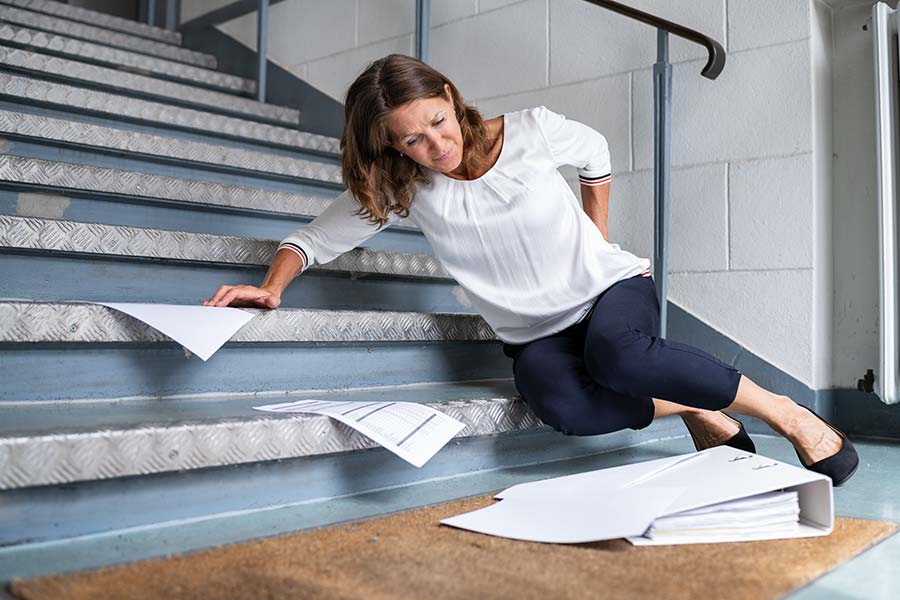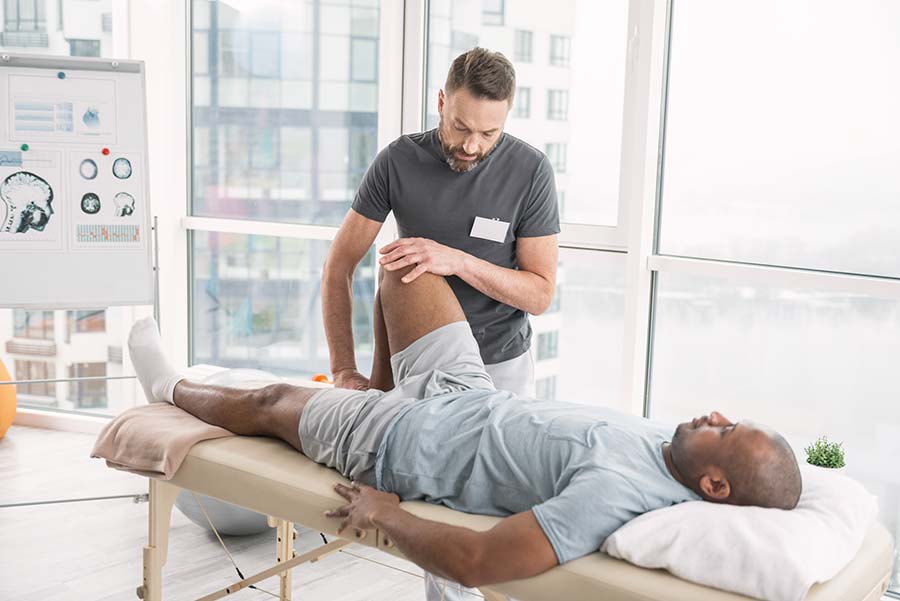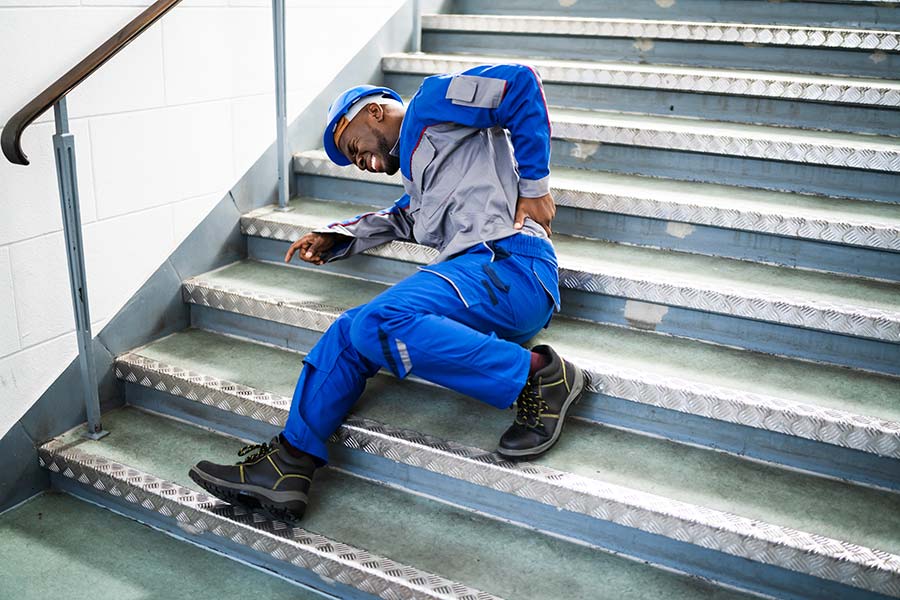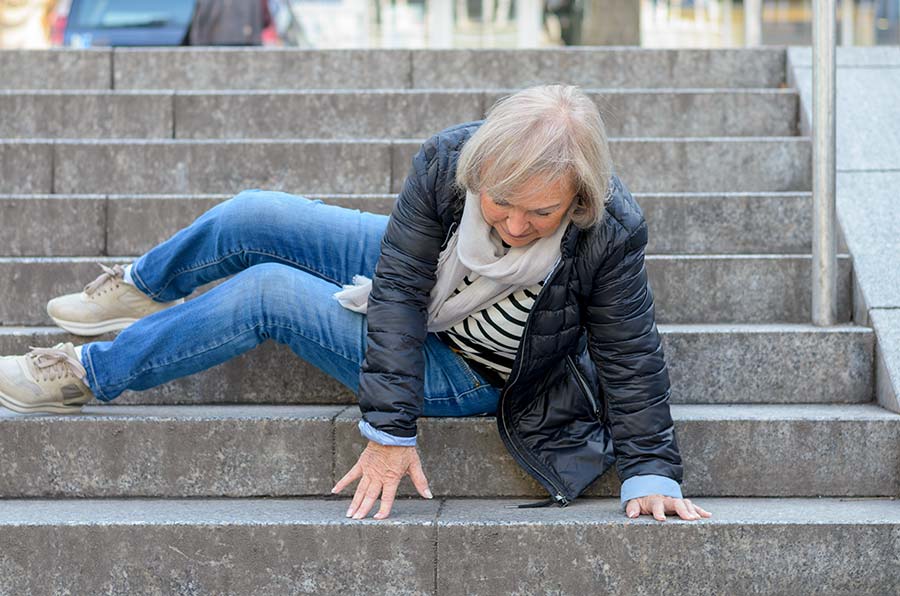Slip and Fall Cases | Premises Liability
The injuries caused by slip-and-fall or trip-and-fall accidents can be severe, including broken hips, fractured wrists, arms and legs, back injuries, and brain injuries and brain injuries. If you were injured because of a slip, trip, fall, or some other hazard on the premises you were on, you may be entitled to sue the possessor of the property for your injuries. Slip and fall cases are based on tort. Because of this, you’ll be required to prove the general elements of a negligence claim. Proving liability or negligence can become complicated quickly, so it’s important to consult with a slip-and-fall accident lawyer as soon after your accident as possible.
At Crane Law, we handle employment, discrimination and personal injury cases throughout Michigan. Since 1995, Steve Crane has successfully represented persons like you.
As an experienced lawyer, Steve can gauge when it makes sense to go to court. He knows that a letter or phone call — with proper wording and timing — can be more effective or cost-efficient than suing for damages or injunctive relief.
For those cases that must be presented to a judge or jury, he is eminently qualified to assert your interests.
If you have sustained a workplace injury, call Steve free. He and his team can assess the facts of your case and help you determine the best course of action to move forward.
To schedule a discrete and confidential consultation about your matter, call Steve free at (888) 855-4400.
Premises liability law in Michigan
Premises liability law in Michigan empowers slip-and-fall and trip-and-fall victims to hold negligent property owners accountable when they or their loved ones suffer injury, harm, or death due to dangerous conditions on the owner’s premises.

Who can be held liable under Michigan’s premises liability law?
In Michigan, property owners and managers, including stores and businesses, can be sued for slip-and-fall and trip-and-fall injuries. Essentially, anyone occupying land intending to control it may be held responsible for injuries or fatalities resulting from negligence.
What are the key components of a case under Michigan’s premises liability law?
To pursue a case against a property owner for slip-and-fall injuries in Michigan, a victim must establish several elements: the property owner had a duty to protect, this duty was breached, the breach led to injuries, and the extent of the harm incurred. In cases where the victim’s comparative fault is questioned, it may impact the damages recoverable but does not absolve property owners of their duty to exercise reasonable care.
What is a property owner’s responsibility to invitees under Michigan’s premises liability law?
Michigan property owners must exercise reasonable care to safeguard invitees from foreseeable harm caused by hazardous land conditions. This duty includes warning invitees of known dangers and ensuring the premises are safe by conducting inspections, making repairs as necessary, and providing adequate warnings.
Who qualifies as an invitee under Michigan’s premises liability law?
An invitee, as defined by Michigan law, is someone invited onto a property for a commercial benefit to the possessor of the land, such as customers or individuals conducting business. There is an implied expectation of reasonable care to ensure the invitee’s safety due to the potential commercial advantage derived from their presence.
What constitutes a breach of a property owner’s duty under Michigan’s Premises Liability Law?
A property owner breaches their duty to invitees under Michigan law when they fail to take reasonable measures to protect against foreseeable harm from dangerous conditions on the land. This encompasses neglecting necessary repairs or failing to provide adequate warnings.
Under Michigan’s premises liability law, when is a property owner liable to a slip-and-fall victim?
According to the Michigan Supreme Court, a property owner can be held liable for physical harm to invitees caused by a condition on the land if they knew or should have known about the condition’s unreasonable risk of harm, failed to anticipate that invitees would not realize the danger, and neglected to exercise reasonable care to protect them.
What is comparative fault under Michigan’s Premises Liability Law?
Michigan’s premises liability law considers a slip-and-fall victim’s comparative fault, which may reduce the compensation they’re entitled to recover based on their percentage of fault. However, property owners remain accountable for exercising reasonable care regardless of the victim’s actions.
Does Michigan law require property owners to protect against snow and ice?
Yes, Michigan’s premises liability law mandates property owners to take reasonable care to protect invitees against the hazards of natural ice and snow accumulation on their property. Factors such as the timeliness and adequacy of safety measures are considered in determining whether a property owner breached their duty in such cases.

Landmark ruling by the Michigan Supreme Court
Michigan’s premises liability law delineates the circumstances under which property owners can be held accountable for injuries or fatalities arising from slip-and-fall or trip-and-fall incidents due to hazardous conditions on their premises. A significant change occurred on July 28, 2023, as Michigan’s premises liability law was amended to remove immunity previously enjoyed by negligent property owners for over 20 years, particularly concerning hazards considered “open and obvious.”
This landmark ruling by the Michigan Supreme Court reinstates previous legal standards that safeguarded slip-and-fall or trip-and-fall victims, restoring their ability to hold negligent property owners liable for injuries or fatalities caused by dangerous conditions on their premises.
In notable cases such as Kandil-Elsayed vs. F&E Oil, Inc., and Pinsky vs. Kroger Company of Michigan, the Michigan Supreme Court clarified essential aspects of the premises liability law applicable to slip-and-fall or trip-and-fall incidents caused by defects, hazards, or dangerous conditions on others’ property:
- Property owners must exercise reasonable care to protect invitees from unreasonable risks posed by dangerous land conditions.
- The duty of property owners to protect invitees is not diminished by the apparent “open and obvious” nature of a hazardous condition on their premises.
- Property owners cannot claim immunity for injuries or fatalities due to “open and obvious” conditions on their premises.
- Property owners must anticipate harm from open and obvious dangerous conditions.
- A slip-and-fall or trip-and-fall victim’s comparative fault does not bar them from holding a premises owner liable.
Despite the significance of these legal developments, it’s crucial to note that they represent a return to established legal precedents rather than introducing new laws. The justices clarified that they were restoring the state’s premises liability law to its state before the contentious ruling in Lugo vs. Ameritech Corp, Inc., which had been widely condemned and ultimately overturned.
The overruling of Lugo marks the end of a dark chapter in Michigan’s jurisprudence on premises liability law. Under Lugo, negligent property owners enjoyed virtual immunity against slip-and-fall or trip-and-fall claims, fostering an environment where property safety was neglected. With its demise, Michigan’s premises liability law aligns with national standards, offering greater protection to victims and holding negligent property owners accountable.
In summary, Michigan’s premises liability law enables slip-and-fall or trip-and-fall victims to seek legal recourse against negligent property owners. Property owners owe a duty of care to invitees, individuals invited onto the property for commercial purposes, to maintain safe premises and protect against foreseeable dangers. Breaches of this duty may lead to liability if they harm invitees. Additionally, Michigan recognizes comparative fault, where a victim’s actions may impact the recoverable damages. However, property owners remain responsible for exercising reasonable care regardless of comparative fault.
Bringing a slip-and-fall lawsuit against a city, county, or other public agency
Municipalities, counties, and various government entities must maintain the safety of their public spaces, encompassing facilities, playgrounds, parks, streets, and roadways, as well as the trees, bushes, and landscaping within public properties. These public agencies encompass a broad spectrum, including mass transit systems, public colleges and universities, public schools, sanitation and water districts, fire and police departments, public hospitals, and state agencies.
Suppose a governmental entity fails to uphold its duty to keep its premises free from hazards, and such negligence results in a severe injury. In that case, the entity may be deemed liable, held legally responsible, and compelled to provide compensation for damages incurred.
How long after a slip and fall can you sue in Michigan?
In Michigan, you can sue the negligent property owners and managers for three (3) years after a slip and fall. (MCL 600.5805(2)) If you don’t file a slip and fall lawsuit in Michigan within three years, your claim will be time-barred, and you will have lost your right to sue. There may also be additional notice requirements to comply with if your slip and fall involves a municipality or government building or fits within other exceptions where notice must be provided within a set prescribed period.
No matter what state your slip and fall accident occurs in, you should seek an immediate free consultation with an experienced lawyer as soon as possible to make sure you comply with the required statutes of limitations if you bring a lawsuit and to provide notice if required.
Slip and fall cases are also very different from other types of personal injury cases in that most legal discovery should be done immediately or immediately after the accident. Legal discovery in slip-and-fall cases tends to occur mostly in the beginning. It is very front-end heavy due to the critical need to preserve and document the hazard or dangerous condition as it existed during the slip and fall accident.
In Michigan, the notice requirements that may apply to your slip and fall lawsuit include:
- 60-day notice of intent to sue for a slip and fall that occurs on a county road as a result of “a defective county road, bridge, or culvert under the jurisdiction of the board of county road commissioners.” (MCL 224.21(3))
- 120-day notice of intent to sue for a slip and fall resulting from a defective highway. (MCL 691.1404(1))
- 120-day notice of intent to sue for slip and fall that occurs because of “any dangerous or defective public building.” (MCL 691.1406)
- 6-month notice of intent to sue the State of Michigan for your slip and fall. (MCL 600.6431(1) and (4))

What do I need to prove in a slip and fall injury lawsuit?
In a slip-and-fall lawsuit, the burden of proof rests on the injured party to establish the following key elements:
- The defendant possessed ownership, occupancy, or control of the premises where the plaintiff (the individual initiating the lawsuit) sustained the injury.
- The defendant displayed negligence in the utilization or upkeep of the property.
- The defendant’s negligence played a significant role in causing harm to the plaintiff.
Negligence on the part of a property owner implies that they failed to exercise reasonable care given the circumstances, thereby leading to a foreseeable injury to an individual on their property.
Property owners have an affirmative duty to inspect their property
In Michigan, property owners must proactively inspect their property or employ other means to ascertain its condition. In doing so, property owners must exercise reasonable care to identify any potentially hazardous conditions. Additionally, they are required to promptly address, replace, or provide adequate warnings for anything that could reasonably be anticipated to pose a threat to others. Failure to use reasonable care in discovering unsafe conditions on the property and in taking appropriate corrective measures, including repair, replacement, or warning provision, can render property owners liable for negligence.
Dangerous property conditions are frequently the basis for bringing a slip-and-fall lawsuit
At Crane Law, we frequently encounter cases involving various hazardous property conditions, including but not limited to:
- Uneven, fractured, or damaged sidewalks, pavements, or cobblestones.
- Slippery or wet surfaces on sidewalks, pavements, or cobblestones.
- Unmarked potholes or open grates on sidewalks.
- Steep and sloping driveways.
- Insufficient lighting.
- Obstructed store aisles.
- Slippery or wet floors due to rainwater, ice, snow, or spilled substances like oil, grease, water, and other liquids.
- Dropped fruit, vegetables, and other food items on the floors of supermarkets and convenience stores.
- Irregular or narrow staircases or steps.
- Absent or substandard handrails.
- Unsafe balconies or railings.
- Damaged carpeting and transitions in flooring.
- Concealed or obscured curbs, barriers, or potholes.
- Exposed tree roots.
- Cords or wires lying on the ground.
- Low-hanging cords or wires.
- Construction hazards on roads, bridges, sidewalks, and pathways, including debris from construction work.
The monetary damages to expect in a slip and fall lawsuit
In a slip and fall accident lawsuit, the potential monetary damages that can be sought from the property owner found at fault include:
- Compensation for past and future physical pain, mental anguish, and physical impairment.
- Coverage for past and future hospital, medical, and related expenses.
- Recovery for past and future lost wages and diminished earning capacity.
- In exceptionally reckless or egregious misconduct cases, exemplary damages may also be pursued.
Exemplary damages are not meant to punish the wrongdoer but to allow those who have suffered serious damages and who may be due more compensation than what their compensatory damages cover. These more extreme situations include cases where a loved one has suffered a wrongful death or in certain product liability cases, such as the many lawsuits against cigarette companies.
A few reasons you may have grounds for exemplary damages include:
- The judge decides your compensatory damages are not enough
- Punishment for wrongful actions
- Deterrent to similar conduct in the future
- Push for the defense to change their standards and practices
- Precedent for similar punishments for future actions like this
When seeking out exemplary or punitive damages, you may need to seek approval from the judge, or your attorney may be able to request to have these damages awarded. While economic and non-economic damages are typically available, you will need specific approval from the judge to seek these damages. Because they are so rarely awarded, you must know what to expect before starting.
These damages can be difficult to get, however. These damages are rarely awarded and may require special circumstances. Talk to your lawyer if you believe you are eligible for these damages.
It’s important to note that if you share some responsibility for the incident, you may still be eligible to seek damages from the property owner; however, the awarded amount may be adjusted accordingly.
In tragic instances where a person has lost their life due to a slip and fall accident, surviving spouses, children, or other family members have the option to file a wrongful death lawsuit. In such cases, the family can seek compensation for the loss of the decedent’s love, companionship, and affection and the financial support (including salary and wages) the decedent would have provided. Additionally, they can pursue compensation for hospital, funeral, and burial expenses incurred because of the accident.
What should I do if I been injured on another’s property?
Here are some guidelines to follow if you’ve experienced a slip-and-fall accident:
- Collect Evidence of the Hazardous Condition, Including Photos: If your health permits, it’s essential to document the condition in a manner that captures its physical characteristics, such as height, width, depth, and the nature of any substances involved before any repairs are made. You can even use a ruler to measure and photograph the defect. Ensure your photos also show your approach to the hazard and the direction you were walking, as many defects may not be readily visible to even the most cautious pedestrians.
- Preserve Evidence:
- Shoe Preservation: After your fall, refrain from wearing the same shoes again, as they may carry evidence such as oil or debris on the soles that could be valuable for your case. Your attorney may need to have them examined by an expert. The traction on your shoes during the fall can also be subject to expert review.
- Request Video: Notify the property owners to preserve any surveillance video footage. Video evidence can be pivotal in your lawsuit. In some cases, reviewing video may lead to the decision not to pursue a lawsuit, while in others, it may serve as crucial proof that can lead to a settlement or victory at trial.
- Document Your Injuries: Take photographs of your injuries. Even if you didn’t require immediate hospitalization, seeking medical treatment is important. Some injuries may not become evident until days after the accident, and having medical documentation is critical to your compensation claim.
- Be Mindful of the Statute of Limitations: Act promptly if you’ve suffered an injury, as the deadline for initiating a lawsuit, known as the statute of limitations, is typically three years from the date of injury for adults. (MCL 600.5805(2))
- Exercise Caution When Speaking to Insurance Agents: You are not obligated to communicate with any insurance agent representing the property owner. Remember that insurance companies aim to maximize their profits by minimizing or denying claims. Any conversation with an insurance agent is likely to be recorded, and they may attempt to obtain statements that absolve the property owner of liability or reduce your claim’s value. On the other hand, be aware that many insurance policies covering property include a no-fault provision called medical payments coverage, which can help cover your medical expenses without requiring you to release any other potential claims. So, avoid signing any releases or waivers without proper legal guidance.
Why trust us to handle your slip and fall case?
Experience: We have successfully represented injured persons in various accident cases, winning substantial settlements and verdicts.
Attention to Detail: We conduct thorough investigations, collaborate with experts, and gather evidence to build a robust case.
Client-Focused: Your well-being is our priority. We provide individualized attention, keeping you informed and involved in your case.
Risk-Free Consultation: Reach out to us for a free, no-obligation consultation to discuss your case and potential avenues for compensation.
Contingency Fees: We operate on a “No Fee or Costs Unless We Win” basis. You will never pay us a fee until we win for you. We don’t get paid until we win. If there’s no recovery, there’s no fee.

Time is of the essence. Do not wait to file a claim.
Under Michigan’s statute of limitations, individuals who have suffered injuries have a three-year window starting from the injury to initiate a personal injury claim, seeking compensation for the damages resulting from the accident. you can sue the negligent property owners and managers for three (3) years after a slip and fall. (MCL 600.5805(2)) Failing to take legal action within this timeframe renders victims unable to pursue a claim.
To ensure you do not forfeit your right to file a claim, we strongly advise contacting our law firm at your earliest convenience to schedule a consultation. Act promptly to protect your legal rights and explore your options for seeking the compensation you deserve.
QUICK LINKS
Premises liability law in Michigan
Who can be held liable under Michigan’s premises liability law?
What are the key components of a case under Michigan’s premises liability law?
What is a property owner’s responsibility to invitees under Michigan’s premises liability law
Who qualifies as an invitee under Michigan’s premises liability law?
What constitutes a breach of a property owner’s duty under Michigan’s premises liability law?
Under Michigan’s premises liability law, when is a property owner liable to a slip-and-fall victim?
What is comparative fault under Michigan’s premises liability law
Does Michigan law require property owners to protect against snow and ice?
Landmark ruling by the Michigan Supreme Court
Bringing a slip-and-fall lawsuit against a city, county, or other public agency
How long after a slip and fall can you sue in Michigan?
What do I need to prove in a slip and fall injury lawsuit?
Property owners have an affirmative duty to inspect their property
Dangerous property conditions are frequently the basis for bringing a slip-and-fall lawsuit
What monetary damages to expect in a slip and fall lawsuit
What should I do if I’ve been injured on another’s property?
PRACTICE AREAS
